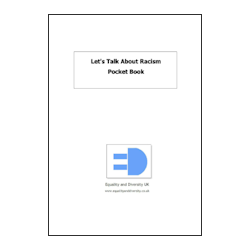Let's Talk about Racism
One of the key findings from Business in the Community’s Race at Work survey of 24,457 people was that employees from all ethnicities in the workplace said that their employers were not comfortable talking about race.
The survey found that conversations around age, gender and sexuality are much easier to have than conversations about race.
We then began conversations with people from many different racial backgrounds about their experiences of talking about race. We also asked them to share what they think some of the barriers are and what some of the solutions might be.
These resources are a result of some of those conversations, professional research and my personal/professional views on this subject. Recommendations from Race in the Workplace (2017) said that a guide should be produced for talking about race.

My hope is that these accessible resources will help to get staff, managers and learners talking about race and ethnicity, discrimination, diversity and inclusion in an environment of ‘uncomfortable confidence and respect’ and spark many new conversations/activities which would not have happened otherwise.
Being black in a white institution can be a bit like the first day of a new learning institution on repeat. Your natural insecurities come to the surface.
- Will I be included?
- Will I be noticed?
- How do I connect with the popular people?
- How do I fit in?
- Will my contributions be valued?
- How will people view me?
Conversations feel like hard work and at times even painful without the ease of shared histories and friendship.
As a minority you experience verbal and non-verbal slights and indignities on a regular basis that, although brief and commonplace, can lead to a deep feeling of isolation and exclusion. I am used to people asking me 'where are you from, do you speak English'? No matter how many times it happens it still feels uncomfortable.
I wonder, am I being oversensitive or are these comment racist?
This kind of encounter, known in EDI training circles as a ‘racial micro aggressions’, is a constant occurrence in the life of a black person. Comments like these often come from well-intentioned people, but without space to examine our racial biases and discuss misconceptions and misunderstandings, you can see how easily hostility can arise. I’ve called these resources Let’s talk about Racism because I believe it is time to have conversations about race in education and training.
Talking about race isn’t easy. Some of the barriers people/communities experiencing racial inequalities face in talking to people about race are defensiveness and dismissiveness. Many people I talk to are not actively racist. They do, however, often struggle to acknowledge the privileges that come with their nationality, national origins and skin colour or perhaps have simply never considered them.
Privileges such as:
- not worrying about what to wear because you’re not going to be racially profiled by the police or be a victim of mistaken identity
- not seeing your physical presence as a constant threat to women, who automatically cross the road or hold tight to their handbags on approach
- not having to overcompensate when finding positive images of your race in books, films and art for your children because of the lack of representation in mainstream media
- being able to discover your family history and legacy with ease
- seeing people who look like you in the highest employment and leadership positions.
We want to start a conversation; to create opportunities for self-reflection, enquiry, understanding and resolution. Ultimately, a conversation that will provoke large and small actions from individuals and groups to help dismantle racist structures in the curriculum, learning institutions and beyond.
We have created 3 resources - A PowerPoint presentation, a Pocketbook and a pack of Activities
These are all available to purchase at £10 each or £20 for all 3 Purchase
Let's Talk about Racism Presentation
Teachers sometimes feel hesitant to raise issues of race because it may be uncomfortable; strong emotions can emerge and teachers may feel they don’t have enough information or background to design, plan or deliver the topic well. This resource provides suggestions and strategies for having conversations with young people about race and racism.
Let's Talk about Racism Pocket Book
Having this conversation about race and racism might make us feel uncomfortable, unable to find the right language or just feel awkward. How can we start to have conversations and get people talking about race, ethnicity and discrimination, even in an environment of uncomfortable confidence? This pocketbook has been produced to help us start talking about race and racism.
Let's Talk about Racism Activities
A racist incident is: ‘any incident which is perceived to be racist by the victim or any other person’ This definition is deliberately broad. In the past, racist incidents nationally have been under-reported and this definition ensures that any reported incident has the scope to be investigated, without the potential of the racist dimension disappearing unchallenged.
Don't Miss out!
Subscribe to receive the latest equality and diversity news, offers and updates



